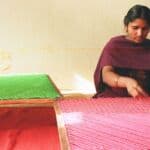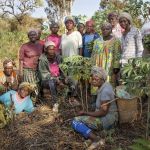The Power of Women in Cocoa: Supporting Female Farmers Could Boost Liberia’s Access to Lucrative Premium Markets
Female farmers play essential—though not always visible—roles in cocoa farming. Across the sector, women work as CEOs, accountants and managers, as well as farmers and labourers. However, in line with the common belief that cash crops like cocoa are “male crops” while subsistence crops are “female crops,” cocoa farming has broadly been considered a male occupation in West Africa.
But when data is collected, this assumption is easily challenged: Women are in fact essential to the production and trade of cocoa. For example, research from West Africa has shown that men are able to intensify their cocoa farming and expand and upgrade as farmers because they rely on women to perform essential roles in cocoa production – as well as to farm food crops and care for the household. In fact, in Côte d’Ivoire, women make up 68% of the cocoa farming workforce. Yet they earn just 21% of the income generated.
According to a gendered value chain analysis by GROW Liberia, a market systems development program funded by Sida and implemented by Adam Smith International that aims to accelerate inclusive and systemic solutions to transform the country’s high-potential industries, female farmers are similarly active, though not always recognized, throughout Liberia’s cocoa value chain. They prepare the land, harvest, crack the pods, and ferment and dry the beans. There are few tasks that are undertaken by men alone, while women are often solely responsible for time-intensive post-harvest activities that are essential to the quality of the cocoa beans – and thus critical to selling cocoa on premium markets.
Women’s importance in tapping into these premium cocoa markets is a topic with key implications for the industry in Liberia – and for the women who work in it. Though the international cocoa and chocolate industry does not have a harmonised definition of “premium,” GROW defines it as cocoa that contains special attributes that set it apart from the bulk market, commanding higher prices as a result. Premium cocoa markets therefore offer a prime opportunity for Liberian farmers – particularly women – to increase their income.
There are three factors that the industry can focus on to pave farmers’ way to these markets: cocoa quality, traceability and sustainability (often linked to certification), and a unique story that sets the product apart. At GROW Liberia, we have found that visible and valued women farmers are an essential ingredient of all three of these factors. Supporting female cocoa farmers boosts the quality of cocoa beans and the sustainability of the cocoa trade. Moreover, gender equality provides a convincing narrative that, when substantiated, could differentiate Liberia as a cocoa producer and boost international demand for its premium cocoa. Below, we’ll explore how the work of female farmers drives the industry – and why efforts to better include female farmers open the door to more lucrative premium market segments and greater social impact.
Targeting Support for Women Cocoa Farmers Boosts Cocoa Quality
Specific efforts to target women cocoa farmers are needed, in order to support these farmers’ essential role in boosting cocoa quality to the levels required on the premium market. Cocoa businesses (including cooperatives, traders, exporters and farmers) understand the importance of female farmers for cocoa bean quality—in particular because of their essential roles in post-harvesting activities, such as breaking pods and drying and fermenting cocoa beans. It is also widely recognized that female farmers tend to have higher training needs than their male counterparts. However, unless they are specifically targeted, women farmers are persistently underrepresented in capacity building initiatives, policy dialogue and cocoa businesses. For example, in our early years GROW Liberia observed that only one in five participants in the Good Agricultural Practices trainings we supported were female. When pressed, male participants in these sessions frequently expressed that they did not consider it necessary for their wives to attend, as the husbands could pass along information to them. In fact, GROW’s research revealed that few men passed on the information gleaned from the trainings to family members, resulting in unequal access to information on the basis of gender, and underperformance among women in terms of yield and quality.
Tailoring support services to female cocoa farmers translates into higher cocoa yields and increased income for farming families, making it a smart business strategy. Once GROW understood the barriers that prevented women from accessing training, we responded by working with cooperatives to carefully adjust the location of the trainings and actively communicate to all actors (including husbands) the importance of female participation. Responding to female farmers’ demands for same-sex trainers, GROW worked with cooperatives to specifically recruit women as Village Coordinators, who act as trainers and provide outreach to remote villages: Soon the number of women coordinators increased from one to 303, which amounted to 47% of all Village Coordinators. Cooperatives also added gender officers to their management structures, recognizing that female farmers are more effectively engaged by female cooperative representatives. Subsequently, female participation in Good Agricultural Practices trainings rose. Moreover, GROW data showed that farming families where women were part of training efforts had 36% higher cocoa yields compared to households where female farmers were not trained.
Transparency Reduces Discrimination Against Women and Paves the Way to Premium Markets
Premium markets require traceability and transparency to reduce unethical working practices and discrimination against women farmers. Supply chain visibility and disclosure are key requirements for accessing premium markets, due to a significant increase in consumer demand for verifiable fairness and sustainability among agricultural products. Cocoa buyers who offer price premiums need to be able to trace the origin of the beans, and they must be confident that unethical working practices – including forced labour, unfair wages, child labour and violence against women – do not damage their brand’s reputation. This is applicable across several premium market segments, from certified (e.g. organic and Fairtrade) to higher quality and fine flavour.
Price premiums can be accessed in a variety of ways, but traceability and transparency coupled with a demonstrable effort to improve fairness in profit distribution and human rights – including gender equality – are increasingly prerequisites for this market. This can be seen, for instance, in the European Union’s upcoming due diligence legislation on agricultural commodities. GROW’s support to our partners has reflected this commitment, and partnering companies such as EJ Flomo Cocoa and women-owned-and-operated Monleh Enterprises have committed to non-discrimination, gender equality and fostering women leaders. These efforts have elicited strong interest from international buyers in early premium market engagement with Liberia and, in Monleh’s case, they paved the way for the company to secure at least one supply contract in 2021.
Visible and Valued Female Cocoa Farmers Appeal to Consumers
Visible and valued female cocoa farmers offer nuance to Liberia’s unique cocoa story. We live in a world where consumers are increasingly aware of the social and environmental impact of the products they buy. And consumers reward companies that credibly demonstrate sustainable practices and positive social impact. For example, in the U.S., between 2017 and 2018, Fairtrade chocolate sales grew twice as fast as ordinary chocolate sales, and sales of chocolate with environmental claims grew more than four times faster.
Cocoa companies can leverage this evolving consumer sentiment by celebrating the many roles of women in cocoa. For instance, Rokbar was set up with the purpose of addressing gender inequalities in the cocoa sector by selling chocolate that’s 100% made and owned by women. In the premium segment, chocolate makers have already demonstrated their willingness to pay higher prices based on the uniqueness of the product – and cocoa that substantially champions female farmers is especially unique. Connecting to premium and specialty markets enables not just growth among cocoa producers (through price premiums), but truly inclusive growth. In the end, this reinforces the efforts of cocoa businesses, GROW Liberia and others to ensure that women are seen, included and valued in Liberia’s cocoa industry.
Visible and confident female cocoa farmers, companies that employ women at fair wages, and companies that are led by women offer a powerful opportunity to establish a distinct story of social impact in Liberia. The more the country’s cocoa industry prioritises women’s inclusion and other sustainable practices, the better it will position itself to tap into lucrative opportunities in the premium market – and the greater the impact it will make on women across the value chain.
Sabine Garbarino is the Gender and Diversity Lead, Amelia Duggan is a Project Manager, and Kim Beevers is the Technical Director of GROW Liberia.
Photo courtesy of GROW Liberia.
- Categories
- Agriculture



